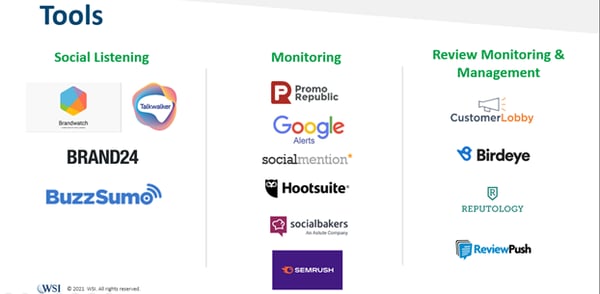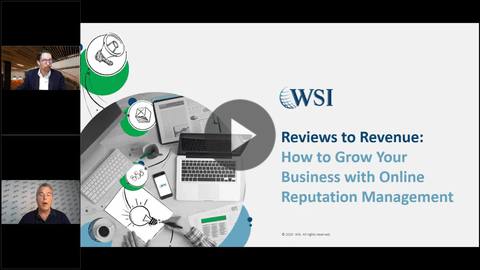Want more positive online reviews to help improve your online reputation? WSI’s Carlos Guzman recently hosted a webinar on online reputation management and ICYMI. You can watch the recording here.
WSI Digital Marketing Consultant, speaker, and author Carlos Guzman held CEO positions in technology companies for nearly 20 years before joining WSI in 2004.
What is Online Reputation Management?
Online reputation management refers to the strategies and practices used to influence the perception of your brand image across various online platforms and offline channels. In today’s digital age, managing how your brand is viewed is essential, whether through social media, review sites, or direct customer interactions. A well-executed online reputation management strategy helps ensure that your online presence reflects the values and quality your business stands for, contributing to a positive brand reputation. By monitoring customer feedback and engaging with favorable and unfavorable reviews, businesses can address concerns promptly, fostering trust with potential customers. This approach strengthens relationships and boosts brand awareness, as consumers are more likely to share and recommend businesses that consistently provide excellent customer experiences. Managing your online reputation is a proactive way to enhance customer loyalty, improve customer experience, and build long-term brand success.
The Importance of Online Reputation Management
More than ever, consumers (both B2C and B2B) are consulting online reviews and ratings before deciding where to spend their hard-earned dollars because they trust online reviews. Not only that, 97% of shoppers who read online reviews from other consumers also read the business responses, which means that not answering or acknowledging the reviews is a bad strategy.
The challenge of online reputation management lies in the time, resources, and technology budget needed. Many of our clients ask, “Where do I start?”
Reputation monitoring and reputation management are key to building trust and credibility around your brand - directly impacting your revenues. Simply put, your online reputation can be your biggest asset if managed well, and if not, it can also be your worst liability.
Three by Three
It’s as simple as one-two-three!
Starting with the three-step process of reputation monitoring and management:
.png?width=600&name=Three%20by%20Three%20Cycle%20(ORM).png)
- Set up your monitoring system or platform
- Gather data
- Carry out reputation management activities
- And repeat
Then there are three ways to approach online reputation management (ORM):
- Social listening tracks mentions of your brand, service, or product on open social networks, blogs, micro-blogging sites, news sites, and forums.
- Review monitoring uses specific review sites like Google, Angie’s List, Better Business Bureau, Yelp, TripAdvisor, and so on.
- Search results monitoring is where you check search engine (predominantly Google) results for brand mentions. To manage your reputation in Google, you need a good SEO strategy.
Reputation Management Strategies to Build a Positive Brand
Building a positive brand reputation requires a combination of reputation management strategies focusing on engagement, transparency, and delivering value to your audience. To encourage customers to leave reviews, create opportunities for them to share their experiences on review sites and social media platforms. Authentic, good reviews boost your brand’s online credibility and help with visibility on search engine results pages.
Social media channels are critical for building a strong connection with your audience. Use these platforms to showcase satisfied customers, respond to favorable and unfavorable reviews, and promptly address any online criticism. A thoughtful response to a negative comment can demonstrate your commitment to excellent service, turning a potentially harmful situation into a positive one. Additionally, engaging with your audience across different social media platforms and creating shareable content increases brand awareness, helping you reach customers at every stage of their journey.
A reputation management firm or online reputation management service can also provide valuable insights into areas that need improvement, helping you stay ahead of challenges. Having a plan in place for responding to reviews ensures that you are equipped to maintain and protect your brand reputation while fostering trust and loyalty.
What Tools Monitor Online Reputation?
Theoretically, you can manually search for your brand’s name on search engines or social media sites, but because the number of channels and internet users is enormous, there are tools to help you efficiently monitor your online reputation.
Choose technology that can:
- Tally the volume of mentions or reviews
- Measure the sentiment or score.
- Establish sources and cloud terms.
- Identify influencers.
Contact your local WSI Consultant for advice on the best tool for your needs.

How to Respond to Negative Reviews
First, what not to do: ignore reviews, even the bad ones! The stats speak for themselves:
- While 94% of consumers say that a bad review has convinced them to avoid a business,
- 44.6% of consumers say they’re more likely to visit a business that responds to negative reviews.
- Additionally, 40% of consumers expect brands to respond within the first hour of reaching out on social media, while 60% expect a response in the first 24 hours.
Because the public finds exclusively glowing reviews a tad suspicious, negative reviews actually increase your credibility. Harvard Business School found that consumers like to see a mix of good, moderate, and bad reviews when trying to determine if a business is trustworthy.
That’s the why; now for the how. Here are important tips for responding to negative reviews:
- Respond promptly.
- Assign the reviewing job to someone specific.
- Publish an internal response policy.
- Empower the people whose job it is to respond.
- Have a tracking system that assures all negatives are addressed.
How to Elicit Positive Reviews
While responding to positive reviews may be easier, never pass up the opportunity to say, “Thank You!” for the unsolicited feedback. Encourage the happy customer to return and mention other products or services that they should try.
Reinforce the positive by sharing the compliment with your team… and the world.
Key to ORM is advocating positive reviews. Here are some tips:
- Monitor your brand to determine your baseline.
- Design a user-friendly website.
- Showcase your expertise with a blog.
- Be active on social media.
- Prove that you are accessible by replying to every question or opinion.
- Share your achievements and awards.
- Keep your content simple.
How can AI help grow your Business's Online Reputation Management?
AI can play a pivotal role in enhancing your business's online reputation management (ORM) by providing tools and insights that allow you to monitor, analyze, and respond to online feedback effectively. Here’s how AI can help:
1. Real-Time Monitoring
AI-powered tools can track mentions of your brand on social media, review sites, forums, and news outlets in real time. This ensures you’re immediately aware of positive and negative feedback, allowing for timely responses that protect your reputation.
2. Sentiment Analysis
AI can analyze the tone and sentiment of customer reviews, social media comments, and other user-generated content. This helps identify trends in public perception, enabling you to address recurring issues or amplify positive feedback.
3. Automated Responses
AI-driven chatbots and response tools can manage customer interactions by answering common queries or addressing simple complaints. This ensures that customers feel heard promptly, which is crucial for maintaining a positive reputation.
4. Insights for Improvement
By analyzing feedback at scale, AI can identify areas where your business is excelling or falling short. For instance, if reviews consistently mention slow service, AI can flag this as an area for operational improvement.
5. Content Generation
AI can help create content such as review responses, social media posts, and blog articles that align with your brand voice. Personalized and thoughtful responses to reviews can significantly enhance customer trust and loyalty.
6. Fake Review Detection
AI can identify suspicious or fake reviews, which may harm your reputation. By flagging such activity, you can take action to have false reviews removed or counter them effectively.
7. Competitor Benchmarking
AI tools can compare your online reputation to competitors, providing insights into your brand's stand in the market. This helps you refine strategies to strengthen your position.
8. Proactive Reputation Building
AI can help you identify influencers and advocates who align with your brand, enabling you to collaborate and amplify positive messages about your business.
9. Crisis Management
In a PR crisis, AI tools can help you gauge the extent of the issue and suggest appropriate responses based on the type of feedback and audience sentiment.
By leveraging AI for online reputation management, businesses can avoid potential issues, build trust with their audience, and foster a positive brand image that drives growth.
Manage Your Online Reputation with SEO and Monitoring
SEO and social media monitoring are powerful tools for managing your business’s online reputation. Your presence on search engine results pages significantly impacts how potential customers perceive your business. To ensure a positive online reputation, prioritize content highlighting your strengths, showcasing positive reviews, and addressing improvement areas.
Active social media monitoring allows you to track what people say about your brand on different social media platforms and channels. Use a platform like Hootsuite or Sprout Social to efficiently track mentions and respond promptly to customer reviews or online criticism. When satisfied customers share their experiences, amplify these stories by engaging with them to demonstrate your commitment to delivering quality service.
Integrating SEO with online channels like blogs and social profiles enhances visibility and supports reputation management strategies. Creating optimized content tailored to your target audience ensures you stay relevant in your industry and strengthens your company image. Building a strong online presence requires consistent engagement, thoughtful responses, and a balance of online and offline efforts to achieve a successful online reputation.
WSI is here to help you strengthen your brand and connect with your audience. Learn how to grow your business and improve your online reputation. Contact your local WSI consultant today! You can watch the full webinar presentation below:






